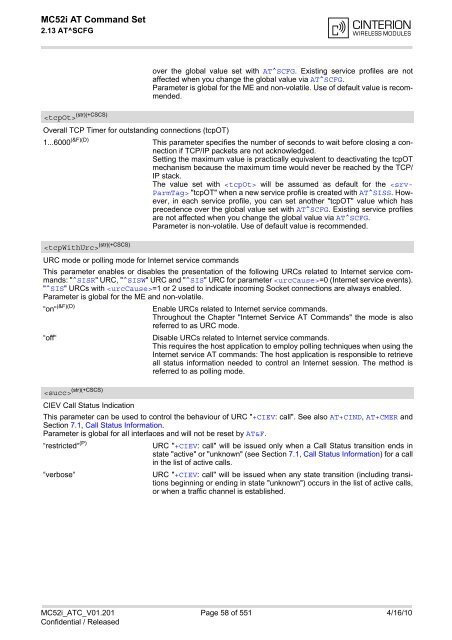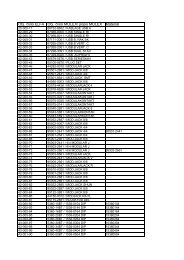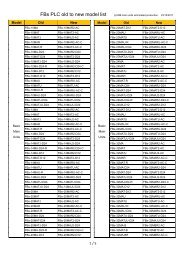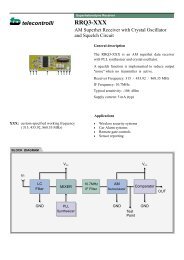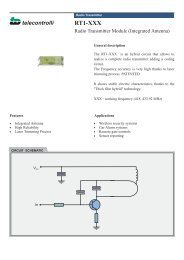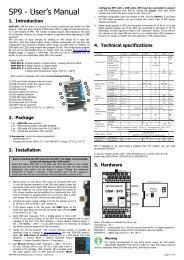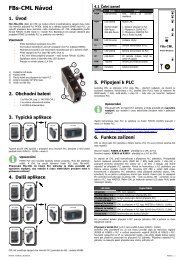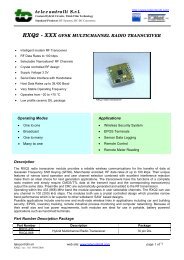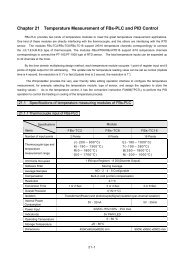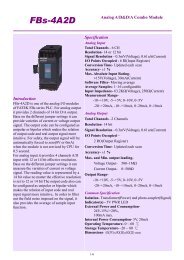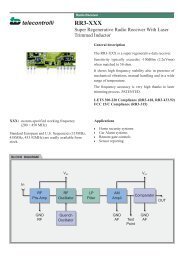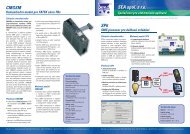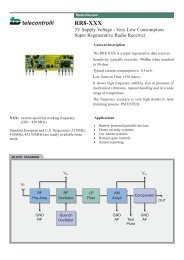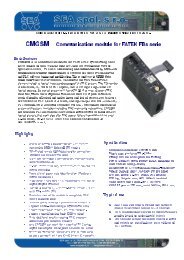- Page 1 and 2:
MC52i MC52i Terminal Version: 01.20
- Page 3 and 4:
MC52i AT Command Set Contents Cont
- Page 5 and 6:
MC52i AT Command Set Contents 6.7
- Page 7 and 8: MC52i AT Command Set Contents 10.1
- Page 9 and 10: MC52i AT Command Set Contents 13.2
- Page 11 and 12: MC52i AT Command Set Contents 18.2
- Page 13 and 14: MC52i AT Command Set List of Figure
- Page 15 and 16: MC52i AT Command Set 1.2 Related d
- Page 17 and 18: MC52i AT Command Set 1.3 Document
- Page 19 and 20: MC52i AT Command Set 1.4 AT Comman
- Page 21 and 22: MC52i AT Command Set 1.6 Supported
- Page 23 and 24: MC52i AT Command Set 1.6 Supported
- Page 25 and 26: MC52i AT Command Set 1.6 Supported
- Page 27 and 28: MC52i AT Command Set 1.8 Errors an
- Page 29 and 30: MC52i AT Command Set 1.10 Serial I
- Page 31 and 32: MC52i AT Command Set 2. Configurati
- Page 33 and 34: MC52i AT Command Set 2.2 AT&V 2.2.
- Page 35 and 36: MC52i AT Command Set 2.4 ATQ 2.4 A
- Page 37 and 38: MC52i AT Command Set 2.6 ATX 2.6 A
- Page 39 and 40: MC52i AT Command Set 2.8 AT+CFUN 2
- Page 41 and 42: MC52i AT Command Set 2.8 AT+CFUN 9
- Page 43 and 44: MC52i AT Command Set 2.8 AT+CFUN 2
- Page 45 and 46: MC52i AT Command Set 2.10 AT+GCAP
- Page 47 and 48: MC52i AT Command Set 2.11 AT+CMEE
- Page 49 and 50: MC52i AT Command Set 2.11 AT+CMEE
- Page 51 and 52: MC52i AT Command Set 2.12 AT+CSCS
- Page 53 and 54: MC52i AT Command Set 2.13 AT^SCFG
- Page 55 and 56: MC52i AT Command Set 2.13 AT^SCFG
- Page 57: MC52i AT Command Set 2.13 AT^SCFG
- Page 61 and 62: MC52i AT Command Set 2.13 AT^SCFG
- Page 63 and 64: MC52i AT Command Set 3. Status Cont
- Page 65 and 66: MC52i AT Command Set 3.2 AT+CIND 3
- Page 67 and 68: MC52i AT Command Set 3.2 AT+CIND N
- Page 69 and 70: MC52i AT Command Set 3.3 AT^SIND U
- Page 71 and 72: MC52i AT Command Set 3.3 AT^SIND E
- Page 73 and 74: MC52i AT Command Set 3.3 AT^SIND +
- Page 75 and 76: MC52i AT Command Set 3.4 AT+CEER
- Page 77 and 78: MC52i AT Command Set 3.4 AT+CEER N
- Page 79 and 80: MC52i AT Command Set 3.4 AT+CEER 3
- Page 81 and 82: MC52i AT Command Set 3.4 AT+CEER 3
- Page 83 and 84: MC52i AT Command Set 3.4 AT+CEER N
- Page 85 and 86: MC52i AT Command Set 3.5 ATS18 3.5
- Page 87 and 88: MC52i AT Command Set 3.6 AT+CPAS 3
- Page 89 and 90: MC52i AT Command Set 4. Serial Inte
- Page 91 and 92: MC52i AT Command Set 4.3 AT&D 4.3
- Page 93 and 94: MC52i AT Command Set 4.5 ATE 4.5 A
- Page 95 and 96: MC52i AT Command Set 4.6 AT+ILRR 1
- Page 97 and 98: MC52i AT Command Set 4.7 AT+IPR 24
- Page 99 and 100: MC52i AT Command Set 4.8 AT+CMUX 4
- Page 101 and 102: MC52i AT Command Set 4.8 AT+CMUX C
- Page 103 and 104: MC52i AT Command Set 5.1 AT+CPIN P
- Page 105 and 106: MC52i AT Command Set 5.1 AT+CPIN N
- Page 107 and 108: MC52i AT Command Set 5.2 AT+CPIN2
- Page 109 and 110:
MC52i AT Command Set 5.3 AT^SPIC
- Page 111 and 112:
MC52i AT Command Set 5.3 AT^SPIC a
- Page 113 and 114:
MC52i AT Command Set 5.4 AT+CLCK
- Page 115 and 116:
MC52i AT Command Set 5.4 AT+CLCK
- Page 117 and 118:
MC52i AT Command Set 5.5 AT^SLCK 5
- Page 119 and 120:
MC52i AT Command Set 5.6 AT+CPWD
- Page 121 and 122:
MC52i AT Command Set 5.6 AT+CPWD E
- Page 123 and 124:
MC52i AT Command Set 6. Identificat
- Page 125 and 126:
MC52i AT Command Set 6.4 AT+CGMM 6
- Page 127 and 128:
MC52i AT Command Set 6.8 AT+CGSN 6
- Page 129 and 130:
MC52i AT Command Set 7. Call relate
- Page 131 and 132:
MC52i AT Command Set 7.3 ATD 7.3 A
- Page 133 and 134:
MC52i AT Command Set 7.4 ATD> 7.4
- Page 135 and 136:
MC52i AT Command Set 7.5 ATD> 7.5
- Page 137 and 138:
MC52i AT Command Set 7.7 ATDI 7.7
- Page 139 and 140:
MC52i AT Command Set 7.9 ATH 7.9 A
- Page 141 and 142:
MC52i AT Command Set 7.11 AT^SHUP
- Page 143 and 144:
MC52i AT Command Set 7.13 ATS6 7.1
- Page 145 and 146:
MC52i AT Command Set 7.15 ATS8 7.1
- Page 147 and 148:
MC52i AT Command Set 7.17 ATO 7.17
- Page 149 and 150:
MC52i AT Command Set 7.19 AT+CBST
- Page 151 and 152:
MC52i AT Command Set 7.21 AT+CLCC
- Page 153 and 154:
MC52i AT Command Set 7.22 AT^SLCC
- Page 155 and 156:
MC52i AT Command Set 7.22 AT^SLCC
- Page 157 and 158:
MC52i AT Command Set 7.22 AT^SLCC
- Page 159 and 160:
MC52i AT Command Set 7.24 AT+CRC 7
- Page 161 and 162:
MC52i AT Command Set 7.26 AT^SCNI
- Page 163 and 164:
MC52i AT Command Set 7.28 AT^STCD
- Page 165 and 166:
MC52i AT Command Set 7.31 ATS2 7.3
- Page 167 and 168:
MC52i AT Command Set 8.2 AT+COPS 8
- Page 169 and 170:
MC52i AT Command Set 8.2 AT+COPS N
- Page 171 and 172:
MC52i AT Command Set 8.3 AT^SOPS
- Page 173 and 174:
MC52i AT Command Set 8.4 AT+CREG
- Page 175 and 176:
MC52i AT Command Set 8.5 AT+CSQ 8.
- Page 177 and 178:
MC52i AT Command Set 8.6 AT^SMONC
- Page 179 and 180:
MC52i AT Command Set 8.7 AT^SMOND
- Page 181 and 182:
MC52i AT Command Set 8.8 AT^MONI 8
- Page 183 and 184:
MC52i AT Command Set 8.8 AT^MONI C
- Page 185 and 186:
MC52i AT Command Set 8.9 AT^MONP 8
- Page 187 and 188:
MC52i AT Command Set 8.10 AT^SMONG
- Page 189 and 190:
MC52i AT Command Set 8.11 AT^SALS
- Page 191 and 192:
MC52i AT Command Set 8.13 AT^SPLM
- Page 193 and 194:
MC52i AT Command Set 8.15 AT^SPLR
- Page 195 and 196:
MC52i AT Command Set 9. Supplementa
- Page 197 and 198:
MC52i AT Command Set 9.2 AT^SACM
- Page 199 and 200:
MC52i AT Command Set 9.4 AT+CAOC 9
- Page 201 and 202:
MC52i AT Command Set 9.5 AT+CCUG
- Page 203 and 204:
MC52i AT Command Set 9.6 AT+CCFC
- Page 205 and 206:
MC52i AT Command Set 9.6 AT+CCFC
- Page 207 and 208:
MC52i AT Command Set 9.7 AT+CCWA P
- Page 209 and 210:
MC52i AT Command Set 9.7 AT+CCWA E
- Page 211 and 212:
MC52i AT Command Set 9.8 AT+CHLD N
- Page 213 and 214:
MC52i AT Command Set 9.9 AT+CLIP
- Page 215 and 216:
MC52i AT Command Set 9.11 AT+COLP
- Page 217 and 218:
MC52i AT Command Set 9.12 AT+CPUC
- Page 219 and 220:
MC52i AT Command Set 9.13 AT+CSSN
- Page 221 and 222:
MC52i AT Command Set 9.14 AT+CUSD
- Page 223 and 224:
MC52i AT Command Set 10. Internet S
- Page 225 and 226:
MC52i AT Command Set = "none". Thi
- Page 227 and 228:
MC52i AT Command Set 10.1 AT^SICS
- Page 229 and 230:
MC52i AT Command Set 10.1 AT^SICS
- Page 231 and 232:
MC52i AT Command Set 10.2 AT^SICI
- Page 233 and 234:
MC52i AT Command Set 10.3 AT^SISS
- Page 235 and 236:
MC52i AT Command Set 10.3 AT^SISS
- Page 237 and 238:
MC52i AT Command Set 10.3 AT^SISS
- Page 239 and 240:
MC52i AT Command Set 10.3 AT^SISS
- Page 241 and 242:
MC52i AT Command Set 10.3 AT^SISS
- Page 243 and 244:
MC52i AT Command Set 10.4 AT^SISI
- Page 245 and 246:
MC52i AT Command Set 10.5 AT^SISO
- Page 247 and 248:
MC52i AT Command Set 10.5 AT^SISO
- Page 249 and 250:
MC52i AT Command Set 10.5 AT^SISO
- Page 251 and 252:
MC52i AT Command Set 10.6 AT^SISC
- Page 253 and 254:
MC52i AT Command Set 10.7 AT^SISR
- Page 255 and 256:
MC52i AT Command Set 10.8 AT^SISW
- Page 257 and 258:
MC52i AT Command Set 10.8 AT^SISW
- Page 259 and 260:
MC52i AT Command Set 10.9 AT^SIST
- Page 261 and 262:
MC52i AT Command Set 10.11 Interne
- Page 263 and 264:
MC52i AT Command Set 10.11 Interne
- Page 265 and 266:
MC52i AT Command Set 10.12 Example
- Page 267 and 268:
MC52i AT Command Set 10.12 Example
- Page 269 and 270:
MC52i AT Command Set 10.12 Example
- Page 271 and 272:
MC52i AT Command Set 10.12 Example
- Page 273 and 274:
MC52i AT Command Set 10.12 Example
- Page 275 and 276:
MC52i AT Command Set 10.12 Example
- Page 277 and 278:
MC52i AT Command Set 11. GPRS Comma
- Page 279 and 280:
MC52i AT Command Set 11.2 AT+CGANS
- Page 281 and 282:
MC52i AT Command Set 11.3 AT+CGATT
- Page 283 and 284:
MC52i AT Command Set 11.4 AT+CGAUT
- Page 285 and 286:
MC52i AT Command Set 11.5 AT+CGERE
- Page 287 and 288:
MC52i AT Command Set 11.6 AT+CGDAT
- Page 289 and 290:
MC52i AT Command Set 11.7 AT+CGDCO
- Page 291 and 292:
MC52i AT Command Set 11.9 AT+CGQMI
- Page 293 and 294:
MC52i AT Command Set 11.9 AT+CGQMI
- Page 295 and 296:
MC52i AT Command Set 11.10 AT+CGQR
- Page 297 and 298:
MC52i AT Command Set 11.10 AT+CGQR
- Page 299 and 300:
MC52i AT Command Set 11.11 AT+CGRE
- Page 301 and 302:
MC52i AT Command Set 11.12 AT+CGSM
- Page 303 and 304:
MC52i AT Command Set 11.14 AT^SGCO
- Page 305 and 306:
MC52i AT Command Set 11.16 ATD*99#
- Page 307 and 308:
MC52i AT Command Set 11.18 ATH 11.
- Page 309 and 310:
MC52i AT Command Set 11.20 Using G
- Page 311 and 312:
MC52i AT Command Set 11.21 Using t
- Page 313 and 314:
MC52i AT Command Set 12.1 FAX para
- Page 315 and 316:
MC52i AT Command Set 12.2 AT+FBADL
- Page 317 and 318:
MC52i AT Command Set 12.4 AT+FBOR
- Page 319 and 320:
MC52i AT Command Set 12.6 AT+FCLAS
- Page 321 and 322:
MC52i AT Command Set 12.8 AT+FCR 1
- Page 323 and 324:
MC52i AT Command Set 12.10 AT+FDFF
- Page 325 and 326:
MC52i AT Command Set 12.12 AT+FDR
- Page 327 and 328:
MC52i AT Command Set 12.14 AT+FET
- Page 329 and 330:
MC52i AT Command Set 12.16 AT+FLID
- Page 331 and 332:
MC52i AT Command Set 12.18 AT+FMFR
- Page 333 and 334:
MC52i AT Command Set 12.20 AT+FPHC
- Page 335 and 336:
MC52i AT Command Set 12.22 AT+FRH
- Page 337 and 338:
MC52i AT Command Set 12.24 AT+FRS
- Page 339 and 340:
MC52i AT Command Set 12.26 AT+FTM
- Page 341 and 342:
MC52i AT Command Set 12.28 AT+FVRF
- Page 343 and 344:
MC52i AT Command Set 13.1 SMS para
- Page 345 and 346:
MC52i AT Command Set 13.1 SMS para
- Page 347 and 348:
MC52i AT Command Set 13.3 AT+CMGD
- Page 349 and 350:
MC52i AT Command Set 13.5 AT+CMGL
- Page 351 and 352:
MC52i AT Command Set 13.6 AT+CMGR
- Page 353 and 354:
MC52i AT Command Set 13.7 AT+CMGS
- Page 355 and 356:
MC52i AT Command Set 13.8 AT+CMGW
- Page 357 and 358:
MC52i AT Command Set 13.9 AT+CMSS
- Page 359 and 360:
MC52i AT Command Set 13.11 AT+CNMI
- Page 361 and 362:
MC52i AT Command Set 13.11 AT+CNMI
- Page 363 and 364:
MC52i AT Command Set 13.12 AT+CPMS
- Page 365 and 366:
MC52i AT Command Set 13.14 AT+CSCB
- Page 367 and 368:
MC52i AT Command Set 13.16 AT+CSMP
- Page 369 and 370:
MC52i AT Command Set 13.17 AT+CSMS
- Page 371 and 372:
MC52i AT Command Set 13.18 AT^SLMS
- Page 373 and 374:
MC52i AT Command Set 13.20 AT^SMGO
- Page 375 and 376:
MC52i AT Command Set 13.21 AT^SMGR
- Page 377 and 378:
MC52i AT Command Set 13.23 AT^SSDA
- Page 379 and 380:
MC52i AT Command Set 14. SIM relate
- Page 381 and 382:
MC52i AT Command Set 14.2 AT^SXSM
- Page 383 and 384:
MC52i AT Command Set 14.3 AT^SCKS
- Page 385 and 386:
MC52i AT Command Set 14.4 AT^SCID
- Page 387 and 388:
MC52i AT Command Set 15. SIM Applic
- Page 389 and 390:
MC52i AT Command Set 15.1 Usage of
- Page 391 and 392:
MC52i AT Command Set 15.2 Remote-S
- Page 393 and 394:
MC52i AT Command Set 15.2 Remote-S
- Page 395 and 396:
MC52i AT Command Set 15.3 Remote-S
- Page 397 and 398:
MC52i AT Command Set 15.4 AT^SSTA
- Page 399 and 400:
MC52i AT Command Set 15.5 ^SSTN 15
- Page 401 and 402:
MC52i AT Command Set 15.6 AT^SSTGI
- Page 403 and 404:
MC52i AT Command Set 15.7 AT^SSTGI
- Page 405 and 406:
MC52i AT Command Set 15.9 AT^SSTGI
- Page 407 and 408:
MC52i AT Command Set 15.10 AT^SSTG
- Page 409 and 410:
MC52i AT Command Set 15.12 AT^SSTG
- Page 411 and 412:
MC52i AT Command Set 15.14 AT^SSTG
- Page 413 and 414:
MC52i AT Command Set 15.15 AT^SSTG
- Page 415 and 416:
MC52i AT Command Set 15.16 AT^SSTG
- Page 417 and 418:
MC52i AT Command Set 15.17 AT^SSTG
- Page 419 and 420:
MC52i AT Command Set 15.18 AT^SSTG
- Page 421 and 422:
MC52i AT Command Set 15.19 AT^SSTG
- Page 423 and 424:
MC52i AT Command Set 15.20 AT^SSTG
- Page 425 and 426:
MC52i AT Command Set 15.21 AT^SSTG
- Page 427 and 428:
MC52i AT Command Set 15.23 AT^SSTR
- Page 429 and 430:
MC52i AT Command Set 15.25 AT^SSTR
- Page 431 and 432:
MC52i AT Command Set 15.27 AT^SSTR
- Page 433 and 434:
MC52i AT Command Set 15.29 AT^SSTR
- Page 435 and 436:
MC52i AT Command Set 15.31 AT^SSTR
- Page 437 and 438:
MC52i AT Command Set 15.33 AT^SSTR
- Page 439 and 440:
MC52i AT Command Set 15.34 AT^SSTR
- Page 441 and 442:
MC52i AT Command Set 15.36 AT^SSTR
- Page 443 and 444:
MC52i AT Command Set 15.38 AT^SSTR
- Page 445 and 446:
MC52i AT Command Set 15.40 AT^SSTR
- Page 447 and 448:
MC52i AT Command Set 15.42 AT^SSTR
- Page 449 and 450:
MC52i AT Command Set 15.44 Example
- Page 451 and 452:
MC52i AT Command Set 15.44 Example
- Page 453 and 454:
MC52i AT Command Set 16.2 AT+CPBR
- Page 455 and 456:
MC52i AT Command Set 16.2 AT+CPBR
- Page 457 and 458:
MC52i AT Command Set 16.3 AT+CPBS
- Page 459 and 460:
MC52i AT Command Set 16.4 AT+CPBW
- Page 461 and 462:
MC52i AT Command Set 16.5 AT^SPBC
- Page 463 and 464:
MC52i AT Command Set 16.7 AT^SPBG
- Page 465 and 466:
MC52i AT Command Set 16.7 AT^SPBG
- Page 467 and 468:
MC52i AT Command Set 16.8 AT^SPBS
- Page 469 and 470:
MC52i AT Command Set 16.8 AT^SPBS
- Page 471 and 472:
MC52i AT Command Set 16.10 AT^SDLD
- Page 473 and 474:
MC52i AT Command Set 17.1 Audio pr
- Page 475 and 476:
MC52i AT Command Set 17.4 AT+CLVL
- Page 477 and 478:
MC52i AT Command Set 17.6 AT+VTD 1
- Page 479 and 480:
MC52i AT Command Set 17.8 AT^SAIC
- Page 481 and 482:
MC52i AT Command Set 17.9 AT^SNFA
- Page 483 and 484:
MC52i AT Command Set 17.10 AT^SNFD
- Page 485 and 486:
MC52i AT Command Set 17.12 AT^SNFM
- Page 487 and 488:
MC52i AT Command Set 17.13 AT^SNFO
- Page 489 and 490:
MC52i AT Command Set 17.14 AT^SNFP
- Page 491 and 492:
MC52i AT Command Set 17.15 AT^SNFS
- Page 493 and 494:
MC52i AT Command Set 17.16 AT^SNFT
- Page 495 and 496:
MC52i AT Command Set 17.17 AT^SNFV
- Page 497 and 498:
MC52i AT Command Set 17.19 AT^SRTC
- Page 499 and 500:
MC52i AT Command Set 18. Hardware r
- Page 501 and 502:
MC52i AT Command Set 18.2 AT+CALA
- Page 503 and 504:
MC52i AT Command Set 18.3 AT^SBC 1
- Page 505 and 506:
MC52i AT Command Set 18.3 AT^SBC N
- Page 507 and 508:
MC52i AT Command Set 18.5 AT^SCTM
- Page 509 and 510:
MC52i AT Command Set 18.5 AT^SCTM
- Page 511 and 512:
MC52i AT Command Set 18.6 AT^SSYNC
- Page 513 and 514:
MC52i AT Command Set 19.2 ATS3 19.
- Page 515 and 516:
MC52i AT Command Set 19.4 ATS5 19.
- Page 517 and 518:
MC52i AT Command Set 20.2 Star-Has
- Page 519 and 520:
MC52i AT Command Set 20.2 Star-Has
- Page 521 and 522:
MC52i AT Command Set 20.3 Availabl
- Page 523 and 524:
MC52i AT Command Set 20.3 Availabl
- Page 525 and 526:
MC52i AT Command Set 20.3 Availabl
- Page 527 and 528:
MC52i AT Command Set 20.3 Availabl
- Page 529 and 530:
MC52i AT Command Set 20.4 Availabi
- Page 531 and 532:
MC52i AT Command Set 20.4 Availabi
- Page 533 and 534:
MC52i AT Command Set 20.4 Availabi
- Page 535 and 536:
MC52i AT Command Set 20.4 Availabi
- Page 537 and 538:
MC52i AT Command Set 20.5 AT Comma
- Page 539 and 540:
MC52i AT Command Set 20.6 Factory
- Page 541 and 542:
MC52i AT Command Set 20.6 Factory
- Page 543 and 544:
MC52i AT Command Set 20.7 Summary
- Page 545 and 546:
MC52i AT Command Set 20.8 Alphabet
- Page 547 and 548:
MC52i AT Command Set 20.8 Alphabet
- Page 549 and 550:
MC52i AT Command Set 20.8 Alphabet
- Page 551:
MC52i AT Command Set 20.8 Alphabet


